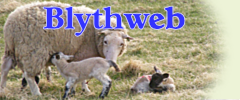An Account of Selling a wife in Blythburgh
The Ipswich Journal of 31st October 1789 carried the following notice:
Oct 29 SAMUEL Balls sold his wife to ABRAHAM RADE in the parish of Blythburgh in this county for 1s. A halter was put round her, and she was resigned up to this Abraham Rade. No person or persons to intrust her with my name, Samuel Balls, for she is no longer my right.
Witnesses,
M. Bullock, constable,
Rob. Sherington,
Samuel Balls,
George Wincop.
Sir John Cullum, of Hardwick House near Bury St Edmunds, saw this report, stuck it in a scrapbook, and wrote alongside: "In this enlightened age, one would hardly think of seeing such an advertisement as the above ... ". We also know from a contemporary directory that George Wincop (sic) was Blythburgh’s village blacksmith (his grave is in the churchyard), and Robert Sherington kept the White Hart.
The Blythburgh event was not unusual. Some 400 documented cases are known, from the seventeenth to the early twentieth century, and there could have been many more, especially in the less censorious eighteenth century when they may not have been noticed. The best–known example is fictional, in Thomas Hardy’s Mayor of Casterbridge. But the casual brutality of this encounter, the fortuitous arrival of the purchaser, who bid on impulse, and the lack of ritual features, make this a misleading stereotype.
The ritual was important: location in a public place, often a market; a formal announcement or advertisement; the use of a halter; the presence of an "auctioneer"; the transfer of money, and sometimes the exchange of pledges. The symbolism was derived from the market sale of goods and chattels, with which the participants were familiar, and intended to make ’lawful’ what was essentially a form of divorce and remarriage.
While the sales took place in a society in which women occupied an inferior position, it may be wrong to assume that they were being represented as chattels. The need to observe a "lawful" procedure was the real significance of the ritual. In fact, the women may rarely have been victims. They knew their value and their rights in their society, and their consent was generally a necessary condition of sale.
Footnote: a Samuel Balls, a single man of Holton, married Mary Bedingfield of Blythburgh by license on 6 August 1782, in the presence of Samuel Thrower and William Blowers. Was this the same Samuel and do we have here an eighteenth–century example of the seven-year itch?
Suggested further reading:
E.P. Thompson, Customs in Common (1991)
S.P. Menefee, Wives for Sale (1981)
Alan Mackley, Blythburgh, April 1994, rev. November 1995.
Back to the History Index
Some Favourite Websites For April 2025:
George Borrow Trust – Explore about the well travelled 1800s poet George Borrow
The George Borrow Trust aims to advance the education of the public in the life and works of George Borrow in particular, by means which preserve, exhibit and study his writings and works and other material objects connected with or tending to perpetuate his memory or to throw light on his life and work.
Stoneware Birds – Life-sized handmade and unique British birds, now available to buy online.
A charming unique gift or a treat for oneself. See the website to know how each one is made. Now available to buy online. Each bird is an individual creation, varying in choice from the perky wren to the plump bullfinch together with other well-loved British birds. Which will you choose?
Andy Seedhouse Boats – Andy Seedhouse Boats, Woodbridge - Boat Sales
A friendly and professional family-run business with an old-fashioned approach to customer service, located on the picturesque waterfront at Woodbridge on the River Deben. From dinghies and day boats to fishing boats and yachts, and even including liveaboard boats too, Andy brings his many years of experience in helping his customers buy and sell. Also chandlery, trailers, etc.
Walberswick Ferry – Offering river trips as well as special occassion bookings
Climb aboard the launch Daybreeze and follow the River Blyth towards Blythburgh through Walberswick Nature Reserve - an Area of Outstanding National Beauty.
Waveney Wholesale – Suppliers of toys, novelties, giftware, china, housewares, pet items, beach goods and so much more
Established Halesworth-based suppliers with over 3000 lines stocked. On-line ordering or call and collect.
